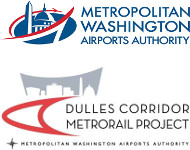Article from: www.thenewspaper.com/news/51/5179.asp
4/7/2017
Virginia: Lawsuit Seeks To Stop $2.8 Billion Toll Diversion
Federal suit goes after Virginia toll road for transferring cash from motorists to transit users.
 State and local governments cannot use an interstate compact to delegate authority to impose tolls and taxes on motorists. That is the central claim of an ongoing federal lawsuit against the Metropolitan Washington Airports Authority (MWAA), which took control of the Dulles Toll Road in 2008 and diverted motorist money, projected to total $2.8 billion, for the construction of a Metrorail line to Dulles International Airport, 25 miles outside the nation's capital.
State and local governments cannot use an interstate compact to delegate authority to impose tolls and taxes on motorists. That is the central claim of an ongoing federal lawsuit against the Metropolitan Washington Airports Authority (MWAA), which took control of the Dulles Toll Road in 2008 and diverted motorist money, projected to total $2.8 billion, for the construction of a Metrorail line to Dulles International Airport, 25 miles outside the nation's capital.
"Among the relief this case seeks is a declaration that MWAA is not a valid interstate compact entity, that it has been given powers it cannot constitutionally exercise, and that it exercises those powers unfettered by the constitutionally required protections against the unaccountable exercise of government powers," attorney Robert J. Cynkar wrote on behalf of motorists.
The US Transportation Department weighed in to oppose the lawsuit.
"Plaintiffs are not able to translate their breathless assertions of a compact entity gone rogue into claims upon which relief can be granted," deputy general counsel Judith S. Kaleta wrote. "This is so because MWAA is a valid interstate compact entity whose relationship to the federal defendants is constitutionally proper."
Phil Kerpen, the free market advocate behind the motorist lawsuit, argues the MWAA simply should not exist.
"Unlike the earlier litigation, the issues raised here go to the heart of MWAA's organization and operation and, specifically, whether such an entity can exist within a constitutional regime that is supposed to make the exercise of governmental power accountable to the men and women subject to it," Cynkar wrote. "MWAA is a constitutional anomaly, far outside settled historical practice on interstate compacts and long-accepted bounds on the delegation of federal legislative and executive powers."
The federal law establishing MWAA, 49 USC Section 49106, specifically states that the organization is "independent of Virginia and its local governments, the District, and the United States government." Yet the MWAA has the power to tax drivers, spend, enforce laws and exercise eminent domain.
"As long as the secretary of Transportation goes along, MWAA can make billion-dollar decisions to approve any project or facility, including commercial enterprises, as long as they are not inconsistent with the needs of aviation," Cynkar wrote. "And to pay for those facilities and their operations, MWAA can fashion any revenue-generating scheme it desires, going so far as to force one group of citizens to subsidize another group of citizens to the tune of billions of dollars."
The argument is that MWAA was formed not as a legitimate compact between two states, but as a way for Congress to put the federally owned DC-area airports outside the regular budgetary process.
The suit seeks restitution for motorists who had their tolls spent on purposes wholly unrelated to their use of the Dulles Toll Road. Once MWAA took over the road, tolls nearly tripled and will continue to rise from $3.25 in 2019 to $7.75 by 2048.
 State and local governments cannot use an interstate compact to delegate authority to impose tolls and taxes on motorists. That is the central claim of an ongoing federal lawsuit against the Metropolitan Washington Airports Authority (MWAA), which took control of the Dulles Toll Road in 2008 and diverted motorist money, projected to total $2.8 billion, for the construction of a Metrorail line to Dulles International Airport, 25 miles outside the nation's capital.
State and local governments cannot use an interstate compact to delegate authority to impose tolls and taxes on motorists. That is the central claim of an ongoing federal lawsuit against the Metropolitan Washington Airports Authority (MWAA), which took control of the Dulles Toll Road in 2008 and diverted motorist money, projected to total $2.8 billion, for the construction of a Metrorail line to Dulles International Airport, 25 miles outside the nation's capital.